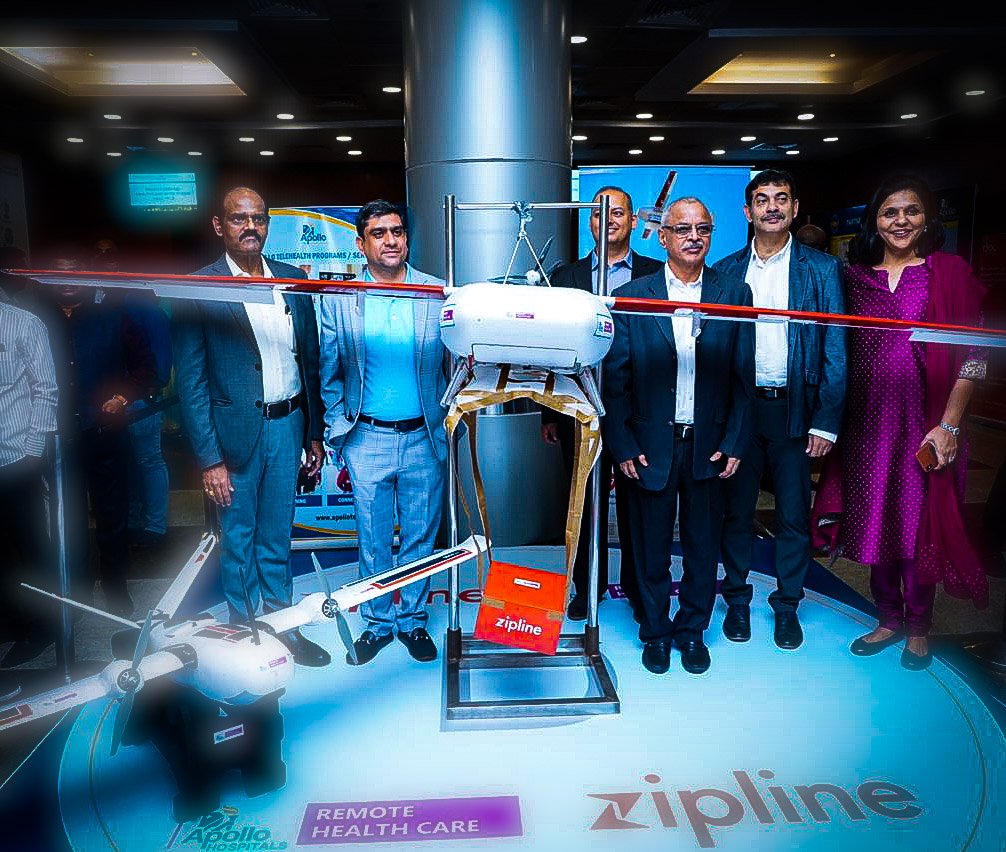Medicine from the Sky
The Government of Telangana is one step closer to rolling out a large-scale programme for delivery of blood and vital medical supplies via drones. It adopted a framework codesigned with the World Economic Forum and Apollo Hospitals Group Healthnet Global Limited that outlines the requirements for drone delivery and how to assess proposals.The programme will connect communities across the state, providing better access to healthcare. A government issued Expression of Interest (EOI) and 2020 pilot will pave the way to rolling out the programme.
New Delhi, India, 4 October 2019 – The Government of Telangana has been exploring the use of drones to increase access to healthcare for communities across the state. Drones can dramatically cut transport times and increase supply chain efficiencies. Countries around the world have experimented with drones for last-mile delivery for the past five years, but the first big leap forward took place in Rwanda, where experiments, or pilot projects, matured into national-scale implementations. Through drones, Rwanda cut the delivery time of medical goods from four hours to fifteen minutes, in some cases, and saved thousands of lives in the process.
Now, Telangana is one step closer to actioning its own large-scale programme to deliver blood and transport of medical samples via drone. The Government has adopted a new framework to implement drones for last mile delivery. This will integrate them into the state’s healthcare supply chain. Co-designed with the World Economic Forum and Healthnet Global Limited, an Apollo Hospitals Group company, the framework will become the foundation for the pilot project to test drone delivery and eventually for an RFP.
“Drones are helping people in remote rural areas become connected to important services,” said Timothy Reuter, Head of Aerospace and Drones, World Economic Forum. “Adopting this framework brings Telangana one step closer to rolling out a system that could save lives. It outlines what challenges drones can solve, how to oversee operations and how to implement them. We are looking forward to the next steps of this project.”
“Apollo Hospitals Group company HealthNet Global Limited truly believes that use of Drones for transport of Organs and other Medical aid will contribute to saving many lives. We are happy working with the World Economic Forum and Government of Telangana, as a clinical partner in this drones project, which I am sure is the next step in our journey of remote healthcare delivery,” says Dr. Sangita Reddy, JMD Apollo Hospitals Group.
“Telangana has been a pioneer in using technology for improving the lives of the citizens. Using drones to deliver blood and other medical goods to people in remote and inaccessible areas is an exemplary project that demonstrates use of technology for the social good,” said K.T. Rama Rao, Minister for Information Technology and Electronics and Communication, Industries and Municipal Administration and Urban Development. This project that could save lives would serve as a reference model for other States in India.
The framework outlines the key factors in evaluating drone operations and the technical requirements for each use case. It will ensure government services are used as efficiently as possible and will serve as the starting point for discussions with civil aviation authorities.
This framework is part of the Drones and Tomorrow’s Airspace Portfolio, run out of the World Economic Forum Centre for the Fourth Industrial Revolution India. The Network brings together government, business, start-ups, international organizations and NGOs to co-design innovative policy solutions to accelerate the benefits of emerging technologies such as drones, artificial intelligence, internet of things, and blockchain while mitigating the risks. Pilot projects have already positively impacted the ecosystem of autonomous flight around the world. A first of its kind Performances Based Regulation (PBR) was published in Rwanda, testing the theory that by promoting a risk focused methodology to evaluating operations, instead of traditional prescriptive government mandates, new and socially important use cases can be enabled. Learn more in ourAdvanced Drone Operations Toolkit: Accelerating the Drone Revolution.
Read the report and learn more about the India Economic Summit here
